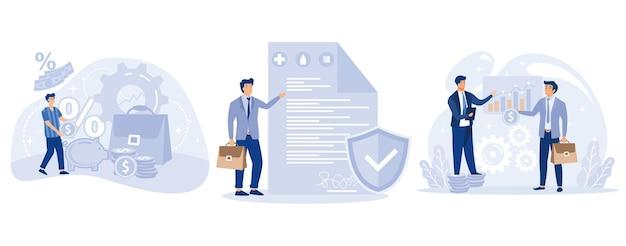As an insurance agent, one of the most frustrating aspects of the job can be dealing with chargebacks. If you’re not familiar with the term, a chargeback occurs when a policyholder cancels their policy shortly after purchasing it or fails to make their premium payments. When this happens, the insurance carrier can claw back any commission that was paid out to the agent.
Final expense chargebacks and Family First Life chargebacks are some of the most common types of chargebacks that agents face. While chargebacks can be a frustrating part of the insurance business, it’s important to understand how they work and the impact they can have on your bottom line.
In this comprehensive guide, we’ll explore the ins and outs of insurance agent chargebacks. We’ll look at the definition of a chargeback in insurance sales, how they work, and the difference between a chargeback and a clawback. So, whether you’re a seasoned agent or just starting in the industry, keep reading to learn everything you need to know about insurance agent chargebacks.
Insurance Agent Chargebacks: What are they and How do they work
As an agent working with an insurance company, you may have come across the term “chargeback.” But what are chargebacks, and why do they matter? In this section, we’ll take a closer look at this phenomenon and outline how it can affect your income and career as an insurance agent.
Defining Chargebacks
In the world of insurance, chargebacks occur when an insurance company is required to refund a commission payment to an agent. For instance, if a customer who purchased a policy through an agent later cancels the policy, the agent’s commission payment may be “charged back” to account for the refunded premium. This means that the insurance company will take back the commission payment, leaving the agent with less income.
Understanding the Impact
Chargebacks can have a significant impact on the income of an insurance agent. Since the commission payments are based on sales, if a significant number of policies are cancelled or lapse, the agent may see a reduction in income. Additionally, chargebacks are sometimes retroactive, meaning that an agent may have to repay a commission payment that was earned months or even years in the past.
Minimizing Chargebacks
While chargebacks may seem like an inevitability of the insurance industry, there are steps that agents can take to reduce their risk. For instance, agents can work to identify customers who are more likely to cancel their policies and focus efforts on retaining these customers or finding more stable prospects. Additionally, agents can work to ensure clear communication with clients and provide top-notch customer service to reduce the likelihood of cancellations.
Chargebacks can be a frustrating and challenging aspect of working as an insurance agent. However, with the right strategies in place, agents can work to minimize their risk and protect their income. By focusing on customer retention and providing excellent service, agents can help ensure long-term success in the industry.
Final Expense Chargebacks
As an insurance agent, dealing with chargebacks is part of the job. One type of chargeback that you may encounter is final expense chargebacks. This is when a policyholder cancels their insurance policy and requests a refund after the policy has been in effect for a certain amount of time. Final expense chargebacks can be frustrating for insurance agents because they can lose money on commissions and end up with money owed to the insurance company.
The Root of the Problem
There are several reasons why final expense chargebacks occur. One reason may be that the policyholder did not fully understand what they were getting into when they signed up for the policy. Perhaps they were sold something that they didn’t need or couldn’t afford in the first place. On the other hand, some policyholders may have experienced a change in their financial situation and now cannot afford to continue paying for the policy.
How to Avoid Final Expense Chargebacks
To avoid final expense chargebacks, it is essential to communicate clearly with your clients from the beginning. Explain the policy in detail, making sure they understand all the terms and conditions and what they are signing up for. Be upfront about commissions and fees so that they don’t feel like they are being taken advantage of. Follow up with your clients regularly to check in and ensure that they are still happy with their policy.
What to Do When It Happens
Despite your best efforts, final expense chargebacks may still occur. When this happens, it is essential to respond quickly and effectively. Contact the policyholder to find out why they are canceling the policy and if there is anything you can do to help. Work with the insurance company to get the refund processed as quickly as possible. Finally, take the time to evaluate what went wrong and what you can do differently in the future to avoid similar situations.
In conclusion, final expense chargebacks can be challenging for insurance agents, but they are not insurmountable. By communicating effectively with your clients, being transparent about commissions and fees, and responding quickly when refunds are requested, you can minimize the impact of chargebacks on your business.
Family First Life Chargebacks: What are They and How to Avoid Them
Insurance agents who work with Family First Life may often hear the term “chargebacks.” This happens when the insurance policy that an agent sold gets canceled by the policyholder, resulting in the insurance company requesting a refund of the commission the agent earned. Chargebacks can be damaging to an agent’s income and can lead to financial instability if not managed properly.
Why Chargebacks Occur
Chargebacks usually happen when the policyholder cancels their policy due to financial reasons or simply changing their mind. It can also occur if the policyholder passes away, and the beneficiaries file a claim. Other reasons for chargebacks may include incomplete or incorrect information on the application, leading to the insurer canceling the policy.
How to Avoid Chargebacks
As an insurance agent, there are several strategies you can implement to reduce chargebacks. Firstly, ensure that the policyholder’s financial situation is stable and they can afford the premium payments. Additionally, be upfront with clients about the benefits and limitations of a particular policy and make sure they have realistic expectations. It’s also essential to ensure that the application process is thorough and complete, with accurate information provided.
Another strategy is to stay in touch with clients regularly and provide excellent customer service. Maintaining good communication can help you identify any issues or concerns your clients may have with their policy and take proactive steps to address them before they decide to cancel it.
Chargebacks are an inevitability in the insurance industry. However, with the right strategies in place, you can reduce the likelihood of them happening. By being upfront with clients, ensuring their financial stability, maintaining good communication, and providing excellent customer service, you can minimize your chargeback rate and protect your financial stability as an insurance agent.
Insurance Chargeback Definition
As an insurance agent, one of the terms you may encounter is chargeback. Simply put, a chargeback is the reversal of a commission payment from the agent to the insurance carrier. This occurs when a policyholder cancels their policy shortly after buying it, and the carrier has to refund the premium payment. The commission paid to the agent is also refunded, resulting in a chargeback.
Why Do Chargebacks Happen
Chargebacks happen when a policyholder cancels their insurance policy within a certain period of time known as the chargeback period. The chargeback period typically lasts for 90 days from the time the policy was issued. If the policy is canceled during this period, the insurance carrier must refund the premium payment, and the agent must give back the commission earned from the sale.
How Do Chargebacks Affect Agents
Chargebacks can have a significant impact on an insurance agent’s earnings. As an agent, you work hard to sell policies and earn commission payments. Chargebacks can reduce these earnings and affect your commission pay and sales performance. It’s important to keep track of the chargeback period and ensure that policies sold are written and issued accurately to reduce the risk of chargebacks.
How to Prevent Chargebacks
To prevent chargebacks, it’s essential to ensure that policies sold are written and issued accurately. This includes verifying that the policyholder’s information is correct and up-to-date, ensuring that all application questions are answered accurately, and verifying that the policy’s effective date is correct. It’s also crucial to follow up with policyholders within the chargeback period to ensure they are satisfied with their policy and don’t plan to cancel it.
In conclusion, chargebacks are an important aspect of the insurance agent’s life that needs to be adequately understood to avoid them. As an agent, it’s crucial to ensure that policies are written and issued accurately to reduce the risk of chargebacks. By doing so, agents can protect their commission earnings and enhance their sales performance.
How Do Chargebacks Work in Insurance
If you own an insurance business, you may have come across the term “chargebacks.” Chargebacks occur when an insurer disputes a transaction and requests a refund of the premium previously paid to the insurance agent. This can happen for a variety of reasons, including fraud, policy cancellations, or errors in billing.
Understanding Chargeback Reason Codes
To initiate a chargeback, insurers must provide a reason code that outlines the specific justification for the dispute. Some common reason codes include policy cancellation, identity theft, and fraud. By understanding the reason code, insurance agents can work to address the underlying issue and prevent future chargebacks.
The Chargeback Process
The chargeback process typically starts when a policyholder contacts their insurance company to dispute a transaction. The insurer will then investigate the matter and determine whether the chargeback is valid. If the chargeback is approved, the insurer will request a refund from the insurance agent, who may be required to provide additional information or documentation to support their case.
Minimizing Chargebacks
To prevent chargebacks, insurance agents should ensure that they properly document all transactions and communicate clearly with policyholders. Agents should also regularly review their billing statements to identify and address any unusual patterns or discrepancies. By proactively addressing potential issues, agents can minimize the risk of chargebacks and maintain a positive relationship with their customers.
In conclusion, chargebacks can be a significant challenge for insurance agents, but by understanding the reasons behind them and taking proactive steps to prevent them, agents can protect their business and maintain customer loyalty.
What is a Chargeback in Insurance Sales
If you’re an insurance agent, you must understand the term “chargeback” and its implications on your earnings. A chargeback is when a commission previously paid to you is returned to the insurance company. It usually occurs when a client cancels their insurance policy before a predetermined period, a policy with a considerable payout is dismissed, or premium payments become irregular.
Why do Chargebacks Happen
Chargebacks happen because insurance companies want to incentivize agents to sell insurance policies that clients stick with for the long term. If a policy is canceled or terminated within a set time frame, the commission paid to the agent is returned to the insurance company.
How do Chargebacks Affect Insurance Agents
Chargebacks can have a significant impact on an insurance agent’s earnings, especially for agents that work on a commission-based salary. It means that an agent must pay back the portion of the commission that corresponds to a canceled policy. So, if an agent makes a $1,000 commission on a policy and the policy gets canceled, they need to return the commission they received back to the insurance company.
Chargeback Prevention Strategies for Insurance Agents
As an insurance agent, it’s essential to sell policies that your clients can maintain over the long haul. It means that you should present accurate information about the policy, the premium, and the terms and conditions. You need to listen to your clients’ needs and offer policies that suit their budget and expectations. Also, following standard procedures and timely processing of paperwork can prevent most chargebacks.
Wrapping Up
Chargebacks can have a detrimental effect on an insurance agent’s bottom line, but they are avoidable with diligence and due process. Agents must adequately explain policies, listen to clients, and provide accurate information to avoid chargebacks. Are you an insurance agent? What strategies do you use to avoid chargebacks? Share your thoughts in the comments.
Understanding Chargebacks in Insurance Sales
As an insurance agent, you’re supposed to be making a profit by selling insurance policies to clients. However, in some cases, you may incur a loss instead of a profit, and that’s where chargebacks come in.
What Are Chargebacks
Chargebacks refer to situations where the policyholder disputes a charge made on their credit card. The most common reasons for chargebacks in insurance sales include policy cancellation, refunds, or overcharges.
In such situations, the card issuer can reverse (or chargeback) the transaction, meaning the funds are taken back from your account and returned to the client. Chargebacks can occur days, weeks, or even months later, and the chargeback process can be a frustrating experience for insurance agents.
Why Do Chargebacks Happen
Chargebacks happen for various reasons. First and foremost, clients can claim a chargeback as a way of getting out of an insurance policy they no longer need or want. For example, a policyholder may dispute a charge for a life insurance policy after realizing that their employer provides the same coverage.
Similarly, chargebacks can occur if the policyholder feels they’ve been overcharged for a policy or if they’ve suffered some form of loss or damage that isn’t covered by their policy.
How Do Chargebacks Affect Insurance Agents
As an insurance agent, chargebacks can negatively impact your business’s financial health. When a chargeback occurs, the funds are taken back from your account, and you may be subject to additional fees or fines for the disputed transaction.
Additionally, chargebacks can affect your reputation as a reliable and trustworthy insurance agent. Multiple chargebacks can trigger an investigation by your bank or financial institution and may result in the revocation of your license to operate.
Understanding how chargebacks work is an essential aspect of any insurance agent’s operation. By being proactive and taking steps to prevent chargebacks from occurring, you can protect your business’s financial stability and maintain an excellent reputation.
What is the Difference Between a Chargeback and a Clawback
As an insurance agent, it’s essential to understand the differences between chargebacks and clawbacks to avoid any surprises in your finances. These two terms may sound similar, but their meanings are very different.
Understanding Chargebacks
Chargebacks occur when a policyholder disputes a charge on their credit card statement. This may happen due to a billing error or if they don’t recognize the charge. In such cases, cardholders are entitled to dispute the charges, and the funds are credited back to their account, affecting the insurance agent’s earnings.
Understanding Clawbacks
On the other hand, a clawback happens when a policyholder makes changes to their policy, reducing its value, or canceling their policy within the chargeback period. It usually happens within the first few months of the policy term, giving the policyholder the right to claw back some or all of the commissions paid to the insurance agent.
Differences Between Chargebacks and Clawbacks
Chargebacks occur due to disputes over charges on credit card statements, while clawbacks happen when policyholders change or cancel their policies. Another significant difference between these two terms is when they occur. Chargebacks can happen at any time, while clawbacks usually occur within the first few months of a policy term. This is why it’s essential to understand both terms clearly to prevent any surprises when calculating your earnings.
In conclusion, chargebacks and clawbacks are two different terms with entirely different meanings. As an insurance agent, it’s crucial to be aware of how they work to better protect your finances. By understanding the differences between these terms, you will be better prepared to avoid potential financial pitfalls.



